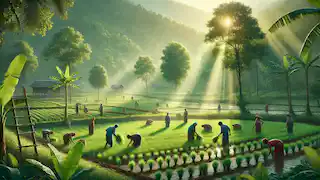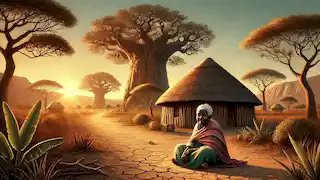Once upon a time, in the vast and sun-drenched lands of Zimbabwe, there lived a wise old woman named Gogo Nyasha. Her name, Nyasha, meant "grace," and she was well-known for her calm demeanor, sharp intellect, and deep understanding of the world. Villagers from all over the region sought her counsel, for it was said that she held knowledge older than the oldest trees, deeper than the deepest rivers, and more vast than the wide-open skies that stretched across the land.
Gogo Nyasha lived in a small, thatched hut on the outskirts of the village, just beyond the great baobab tree, which was said to be as old as time itself. Despite her humble dwelling, her wisdom was as grand as any king’s palace, and her presence as commanding as the roaring Zambezi River. Each morning, she would sit on a woven mat outside her hut, sipping a cup of steaming bush tea, watching the world with eyes that seemed to see far beyond the horizon. Her hut was a sanctuary of stories, both told and untold, filled with herbs, stones, and items from the past that carried great meaning.
One day, the village found itself in the midst of a great famine. The crops had failed, and the once bountiful river had dried to a trickle. The animals were scarce, and the children went to bed hungry. The people, in their desperation, held council meetings and sent their strongest men to neighboring lands in search of food. Yet, no matter how far they traveled, they found little to bring back.
The village elders were at a loss. They debated day and night, but no solution seemed to present itself. The villagers became anxious and fearful, whispering about abandoning their home and seeking refuge elsewhere. But deep down, they knew that leaving their ancestral land, where their forefathers were buried, was not an easy decision to make. The weight of history pressed down upon them.
It was during one such heated council meeting that a young man named Tinashe stood up. Tinashe was not an elder, nor was he particularly wealthy or influential in the village. But he was brave and determined, known for his quick thinking and his unyielding hope, even in the face of adversity.
“We have sought answers from everywhere but from Gogo Nyasha,” Tinashe said, his voice strong despite his youth. “She has lived through times far worse than this. If anyone can guide us, surely it is her.”
At first, the elders dismissed him. They were proud men, with many years of experience, and did not take kindly to being told what to do by someone younger. But as the hunger gnawed at their bellies and the sun scorched the earth, they could not ignore the truth in his words. Finally, after much debate, they agreed to seek out the wise old woman.
So, a delegation was sent to Gogo Nyasha's hut, with Tinashe at its head. As they approached the great baobab tree and the small, unassuming hut beneath it, they were filled with both reverence and hope. Gogo Nyasha was waiting for them, as though she had known they were coming all along.
“Welcome, my children,” she said, her voice soft but filled with a power that commanded attention. “I see you have finally come.”
{{{_01}}}
The delegation bowed in respect, and Tinashe stepped forward. “Gogo, our village is suffering. The crops have withered, the river runs dry, and the animals have fled. We do not know what to do, and we fear we will not survive much longer. Please, share your wisdom with us.”
The old woman nodded slowly, her eyes scanning the faces of the villagers before her. “I have seen this before,” she said. “In times long past, when the earth dried up and the rains refused to fall. The answers you seek are not in distant lands or in the strength of your arms. They are here, in the land itself, in the spirits of your ancestors, and in your hearts.”
The villagers were puzzled. They had expected a practical solution—perhaps advice on where to dig new wells or how to plant more drought-resistant crops. But Gogo Nyasha spoke in riddles, as she often did.
“You must go to the Sacred Mountain,” she continued. “There, at the top, is the Tree of Life, which was planted by the first people to walk this land. Its roots reach deep into the earth, and its branches touch the sky. It is said that those who climb to the top of the mountain and sit beneath its shade will find the answers they seek.”
The elders exchanged uneasy glances. The Sacred Mountain was far, and the journey to its peak was treacherous. Many had tried to reach it over the years, but few had returned. Those who did spoke of strange visions and powerful spirits that guarded the mountain. To send the villagers on such a dangerous journey seemed unwise.
But Tinashe, ever brave and hopeful, stepped forward once again. “I will go, Gogo,” he said. “I will climb the mountain and find the Tree of Life.”
Gogo Nyasha smiled, a twinkle in her eye. “Good,” she said. “But remember, Tinashe, the journey to the mountain is not just a test of your body, but of your spirit. Keep your heart open, and listen to the whispers of the wind. They will guide you.”
And so, Tinashe set off on his journey. The village watched him go, their hopes pinned on his success. As he walked through the dry fields and past the barren riverbanks, he thought of the people he was doing this for—the children, the elders, and even the animals that had fled. His heart was heavy, but he kept Gogo Nyasha’s words in mind, trusting that he would find the answers he needed.
The journey to the Sacred Mountain was long and difficult. Tinashe walked for days, through dry, cracked earth and over rocky hills. The sun beat down on him relentlessly, and his feet grew sore from the uneven ground. But still, he pressed on, determined to reach the mountain and find the Tree of Life.
On the fourth day, as the sun began to set, Tinashe saw the mountain rising in the distance. It was taller than he had imagined, with jagged peaks that seemed to scrape the sky. As he approached, he felt a strange sense of awe and fear. The mountain was ancient, its stones weathered by time, and its slopes covered in thick, twisted trees.
But Tinashe was not one to be deterred. He set his jaw and began the ascent, climbing steadily higher with each step. The air grew cooler as he climbed, and the path became steeper and more difficult. At times, he had to scramble over large rocks or squeeze through narrow crevices in the mountain’s face. But still, he pressed on.
{{{_02}}}
As the days went by, the journey became more challenging. Strange creatures watched him from the shadows, and the wind howled through the trees, whispering ancient songs that chilled him to the bone. But Tinashe did not waver. He remembered Gogo Nyasha’s words, and he listened to the wind’s whispers, hoping to understand the message they carried.
Finally, after many days of climbing, Tinashe reached the top of the mountain. There, in the center of a small clearing, stood the Tree of Life. It was unlike any tree he had ever seen before. Its trunk was wide and gnarled, its bark as smooth as polished stone. Its branches stretched high into the sky, and its leaves shimmered in the sunlight, casting a soft, golden glow over the clearing.
Tinashe approached the tree slowly, his heart pounding in his chest. He could feel the power of the tree, the ancient wisdom that flowed through its roots and branches. He knelt beneath its shade and closed his eyes, hoping that the answers he sought would come to him.
For a long time, there was only silence. The wind had stopped, and the world seemed to hold its breath. But then, slowly, Tinashe began to hear a voice. It was soft at first, like the rustling of leaves in the wind, but it grew stronger with each passing moment. It was the voice of the earth itself, the voice of the ancestors who had walked the land before him.
“Tinashe,” the voice said. “The answers you seek are not in the ground or in the sky. They are in your heart and in the hearts of your people. The earth is thirsty, and the sky will not give rain until the people remember their connection to the land. You must remind them of this bond. Only then will the rains return.”
Tinashe opened his eyes, his heart filled with a deep understanding. He had found the answers he sought—not in the form of a physical solution, but in the wisdom of the ancestors. He thanked the Tree of Life and began the long journey back down the mountain.
When Tinashe returned to the village, he was greeted with joy and relief. But as he stood before the elders, he did not bring tales of treasure or magic. Instead, he spoke of the lessons he had learned from the Tree of Life.
“The earth and the sky are connected, just as we are connected to the land,” he said. “We have forgotten this bond, and until we remember it, the rains will not return. We must honor the land, give thanks to the ancestors, and work together to restore balance.”
The villagers listened in silence, their hearts heavy with the truth of his words. Gogo Nyasha nodded in approval, her eyes gleaming with pride. “The boy has spoken true,”
she said. “The earth is alive, and it feels our actions. We must treat it with respect and care, or we will all suffer.”

From that day forward, the villagers worked together to restore the land. They offered prayers to the ancestors, planted new crops, and dug deep wells to bring water to the surface. They shared what little food they had and cared for one another in a way they hadn’t before.
Slowly, the land began to heal. The river, which had been but a trickle, grew fuller each day. The trees began to bear fruit, and the crops, once withered, started to grow tall and green. And, one day, the rains returned—soft at first, like a whisper, but then stronger, until the earth was soaked and the rivers overflowed.
The village rejoiced, and Tinashe became a hero in the eyes of the people. But he knew that the true hero was the land itself, and the ancestors who had guided him. He thanked Gogo Nyasha for her wisdom and vowed to never forget the lessons he had learned on the Sacred Mountain.
Years passed, and the village prospered. The people lived in harmony with the land, always remembering the bond that connected them to the earth and the ancestors. And though Gogo Nyasha grew older and eventually passed away, her wisdom lived on in the hearts of the people, carried forward by the stories they told and the lessons they passed down to their children.
And so, the story of the wise old woman, the Sacred Mountain, and the Tree of Life was told and retold, a reminder of the power of wisdom, the strength of the human spirit, and the deep connection between the land and its people.
{{{_04}}}

















